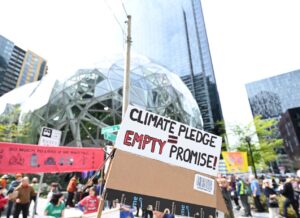Cruise-Free Salish Sea Press Conference as First 2021 Sailing Boards
WHAT: Community members and organizations will hold a press conference TODAY, urging the Port of Seattle to envision a cruise-free Salish Sea, while passengers board the first post-pandemic cruise to Alaska, with a background of giant cruise ships.
WHEN: Today, Monday July 19th, 1pm -2pm (Conference should start at 1:15pm)
WHERE: Smith Cove Park, 1451 23rd ave W, Seattle, WA 98119 (adjacent to Pier 91 Cruise Terminal).
“Fossil fuel emissions from cruise ships and other sources seriously damage human health, contributing to asthma, cancer, and early death.” says Dr. Michael Soman, a member of Washington Physicians for Social Responsibility. “We must work on transitioning away from fossil fuels in all forms of transportation and should definitely think twice about restarting cruises right now, while the pandemic continues. New variants are emerging, and our communities in Seattle and Alaska destinations have not been fully vaccinated.”
“Until this earth is free of the Covid-19 epidemic, there is only danger in mass gathering and travel. It is already proven in Southeast Alaska where a cruise ship is moored in Juneau, the tour cut short, and another cancelled after five people have tested positive. It is alarming and scary that the cruise industry can control ports and small communities not equipped to deal with thousands of transients.” says Wanda Culp, Tlingit, an outspoken advocate for protecting her ancestral homelands. “In 2019, near my home village of Hoonah, 40 airmiles West of Juneau, 138 ships came into our midst and overwhelmed our village of ~800 residents. If CV-19 had not hit in 2020, 211 ships were planned to come into our world! This is madness that must stop! We must cease addiction to big business’s coveting of excess fossil fuel use that kills life right before our eyes!!”
“It’s shameful to think about how Seattle is complicit in an industry with such a toxic business model,” reflects Bob Barnes, longtime labor activist. “We’re looking at hospitality workers making just a couple dollars an hour, working long shifts, seven days a week, for months at a time–all while cruise executives take home multi-million dollar bonuses. Reading reports last year of all the crew members stranded at sea without pay for months on end was just horrifying.”
BACKGROUND: Seattle Cruise Control was started in 2019 to oppose the expansion of the cruise industry in Seattle, in particular, a third cruise terminal at Terminal 46 near Pioneer Square. While the expansion has been paused indefinitely since the pandemic shut down the 2020 cruise season, Port Commissioners and staff continue to speak positively of cruise tourism as an economic engine — while ignoring the impacts to health, climate, water, and marine life, as well as the exploitation of onboard hospitality workers.
- Cruise ship emissions contain carcinogens, toxins, and particulate matter, harming the health of workers, passengers, coastline communities and destination communities, contributing to heart disease, asthma, cancer and premature death.
- Cruise ships are three times as polluting as airplanes per passenger mile–needing to use between 30-50 gallons of fossil fuels to travel just one mile.
- The Port of Seattle estimates that between 80% to 90% of cruise passengers arrive through Seattle-Tacoma International Airport. In 2019, greenhouse gas emissions for the six-month cruise season and its associated flights totaled between 1.6 and 2.1 million tons — equal to about one-third of the emissions of the entire city of Seattle for the whole year.
- Ship noise impedes the ability of marine mammals to communicate and hunt for food; ships also dump plastic trash, sewage, and fuel oil contaminants directly into the ocean.
- Unlimited cruise ship stopovers at local communities can overwhelm those communities, driving local businesses out, and degrading local infrastructure.
- Cruise ships fly flags of convenience, avoiding taxes and bypassing US labor protections. Onboard hospitality staff often only earn about $2/hour, while working seven days a week, for over 10 hours a day.
- In 2020, as covid outbreaks halted cruise travel, tens of thousands of workers were stuck at sea for months on end, often without pay, after passengers were evacuated — even as cruise executives made bonuses higher than in previous years.








